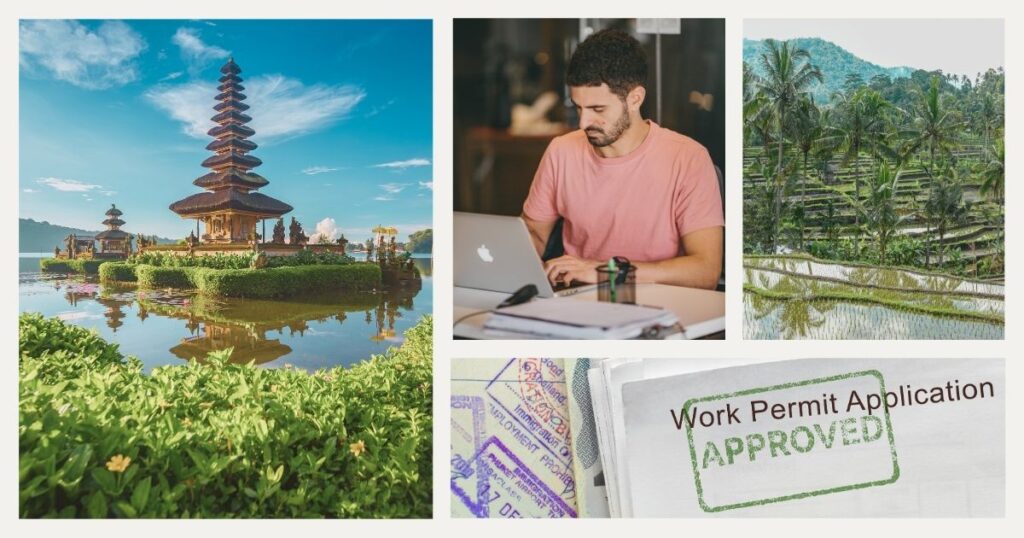Dreams of working legally in one of the world’s most stunning tropical destinations are no longer just fantasies. Thousands of professionals have successfully navigated the Indonesian immigration system to obtain legitimate work authorization in Bali, transforming their careers while enjoying an unparalleled quality of life. However, securing a work permit for Bali requires careful preparation, substantial financial investment, and understanding of a complex legal framework that has evolved significantly in recent years.
The Indonesian government takes work authorization seriously, with strict penalties for those who attempt to work illegally on tourist visas. If caught working without proper authorization, individuals face immediate deportation, substantial fines, and permanent bans on future entry to Indonesia. Understanding how to get a work permit for Bali legally protects you from these serious consequences while opening doors to long-term residency opportunities and career advancement in Southeast Asia’s most dynamic economy. This comprehensive guide will walk you through every aspect of the process, from initial company requirements to renewal procedures, ensuring you have the knowledge needed to work legally in paradise.
Understanding Bali work permit requirements

The foundation of working legally in Bali rests on two essential documents: the KITAS (Limited Stay Permit) and the work permit notification. A work permit for Bali cannot be obtained independently—you must have a sponsoring company that meets specific Indonesian government requirements and demonstrates legitimate need for foreign expertise.
Company sponsorship requirements
To get a work permit for Bali, your sponsoring company must meet strict Indonesian regulations. The company must have a minimum capital of IDR 1 billion per foreign worker, demonstrate that the position requires foreign expertise unavailable locally, and provide extensive documentation proving their legitimate business operations.
Not all businesses qualify to sponsor foreign workers. Small businesses such as dive shops, bars, and basic hospitality operations typically don’t meet the capital requirements or demonstrate sufficient expertise. The sponsoring company must prove they need a foreigner for this particular job and that you’re qualified for the specific position. Additionally, companies must show they’ve attempted to recruit Indonesian nationals for the role without success, maintaining detailed records of their recruitment efforts.
🌟 Pro tip: before committing to any job opportunity, verify that your potential employer has successfully sponsored foreign workers before and understands the complete process, including ongoing obligations like BPJS contributions.
Personal eligibility criteria
Individual requirements include having a passport with at least 18 months validity, relevant educational qualifications that match your intended position, and clean criminal background checks from your home country. Your educational certificates must be translated into Indonesian or English and properly authenticated.
The position you’re applying for must align with your educational background and professional experience. Immigration authorities carefully review whether your qualifications match the job requirements, and mismatches can result in application rejection. Work experience documentation, including reference letters from previous employers and portfolio examples, strengthens your application by demonstrating relevant expertise for your intended role.
💡 Did you know? The Indonesian government has specific job categories reserved for Indonesian nationals. Foreign workers cannot obtain permits for positions like bartending, waiting tables, or basic retail work, regardless of their qualifications.
Essential documents and application process

Gathering the required documentation represents one of the most critical phases in securing a work permit for Bali. The process demands meticulous attention to detail, as missing or improperly prepared documents can result in significant delays or application rejection.
Required documentation
Your personal document package must include a color scan of your complete passport with at least 18 months remaining validity, curriculum vitae stamped by the sponsoring company, and educational certificates translated and authenticated. Recent color photographs meeting Indonesian specifications (typically 4x6cm with red background) are also mandatory.
Your sponsoring company must provide extensive documentation including their business license, company registration documents, tax identification numbers, and proof of sufficient capital. The company must also provide local employee documentation, including Indonesian ID cards of the director and local employees.
Step-by-step process
The work permit application process typically takes 2-3 months and involves multiple Indonesian government agencies working in coordination. The process begins with your sponsoring company applying for RPTKA (Expatriate Placement Plan) approval from the Ministry of Manpower, demonstrating the need for foreign expertise and outlining knowledge transfer plans to Indonesian employees.
Once approved, the company applies for your work e-visa through Indonesia’s online immigration system. Modern processing has eliminated embassy visits in many cases, with electronic visas sent directly to applicants. Upon arrival, you must complete biometric registration at local immigration offices.
For reliable connectivity during the application process, consider using Holafly’s Indonesia eSIM plans to maintain seamless communication with your sponsoring company and Indonesian authorities.
🌟 Pro tip: begin gathering and authenticating your documents immediately once you’ve secured a sponsoring company. Document preparation often takes longer than expected, especially with international authentication requirements.
Costs, timeline, and duration
Financial planning for a work permit for Bali requires understanding both government fees and professional service costs. The total investment typically ranges from $1,000 to $1,500, depending on whether your company handles the process internally or uses accredited visa agents.
Cost breakdown and timeline
Direct government fees include the mandatory DPKK fund payment of $100 USD to the Ministry of Manpower. Professional service fees typically range from $500-800, but this investment often proves worthwhile given the intricate requirements and potential for costly mistakes.
The complete process typically requires 2-3 months from initial application to final approval. RPTKA approval takes approximately 4-6 weeks, followed by 2-3 weeks for e-visa processing. Starting the process 4-5 months before your intended start date provides reasonable protection against delays.
Permit duration and renewal
Most work permits are issued for 12 months, though certain positions may receive only 6-month permits. Directors and commissioners typically receive 12-month permits, while non-management roles often receive 6-month permits that cannot be extended.
Permit renewal requires maintaining good standing with Indonesian authorities, continued employment with the sponsoring company, and compliance with tax and social security obligations. After several years, some workers become eligible for KITAP permanent residence permits.
💡 Did you know? Indonesian work permit holders must contribute to BPJS (Indonesian social security) programs, which provide healthcare benefits but also demonstrate commitment to the Indonesian system.
Legal compliance and common pitfalls

Working legally in Bali extends beyond simply holding valid permits—ongoing compliance with Indonesian law requires understanding tax obligations, reporting requirements, and prohibited activities.
Tax and social security obligations
Work permit holders must register for Indonesian tax identification numbers (NPWP) and comply with local tax reporting requirements. BPJS contributions are mandatory for all work permit holders and must be maintained throughout your stay, providing access to Indonesian healthcare and social security systems.
Restrictions and prohibited activities
Work permits are job-specific, meaning you can only work for the sponsoring company in the exact position specified in your permit documents. Side jobs, freelancing, or working for other companies without separate authorization remains illegal and can void your current permit. Certain business activities remain completely prohibited for foreign workers, including direct retail sales to Indonesian consumers, small-scale food service operations, and various traditional crafts and services reserved for local communities.
🌟 Pro tip: keep detailed records of your Indonesian tax filings, BPJS contributions, and employment documentation. These records become crucial for permit renewals and future residence applications.
Alternative visa options
While traditional work permits remain the standard path, recent developments in Indonesian immigration policy have created alternative pathways for certain categories of remote workers and investors.
Digital nomad and investment visas
Indonesia has introduced a digital nomad visa program allowing remote workers to live in Bali while working for foreign employers. This requires proof of overseas employment, significant financial resources (minimum bank balance around $150,000), and comprehensive health insurance coverage.
For entrepreneurs, Indonesia offers investment visa categories, including the Second Home Visa, which requires substantial financial investment but offers five to ten-year stays with minimal renewal requirements. Business investment visas allow foreigners to establish Indonesian companies based on investment rather than employment.
💡 Did you know? Indonesia’s investment visa programs have been significantly streamlined with online application processes and reduced bureaucratic requirements for qualified investors.
Final thoughts
Successfully obtaining a work permit for Bali requires substantial preparation, financial investment, and commitment to legal compliance, but the rewards of working legally in paradise are immeasurable. The process has become more streamlined with electronic visa systems, though the fundamental need for proper sponsorship and documentation remains unchanged.
The key to success lies in finding a legitimate sponsoring company, preparing documents meticulously, and understanding your ongoing obligations as a legal foreign worker in Indonesia.
Ready to navigate Indonesia’s complex visa landscape? For comprehensive guidance on various visa options across different countries, explore Nomada’s complete guide to digital nomad visa programs to compare alternatives and find the perfect solution for your remote work journey.
Your legal path to working in paradise starts with proper preparation—let Nomada guide you through every step of the process 👉
Frequently asked questions
No, work permit applications typically must be submitted from outside Indonesia through proper immigration channels. Working on a tourist visa is illegal and can result in deportation and future immigration bans from entering the country.
Total costs typically range from $1,000-$1,500, including government fees, professional service charges, and document preparation costs. The mandatory DPKK fund fee is $100, with additional costs varying based on specific circumstances and chosen service providers.
Working without proper authorization can result in immediate deportation, substantial fines for both worker and employer, and permanent bans on future entry to Indonesia. These penalties are strictly enforced by immigration authorities.
Most small businesses cannot meet the minimum capital requirements (IDR 1 billion per foreign worker) or demonstrate sufficient need for foreign expertise under current Indonesian immigration regulations and ministry guidelines.
The complete process typically takes 2-3 months from initial application to final approval, with additional time needed for document preparation and authentication through various government agencies and consular services.




